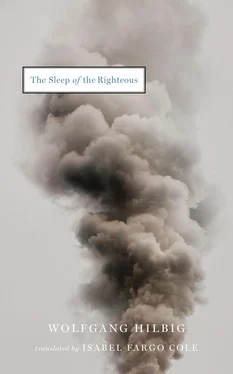Time persisted here in dogged immutability; the autumnal fog banks that merged beneath an earth-colored sky appeared unlikely to pass for decades to come. And more and more smoke seemed to spill from the sodden lowlands into the flat clouds, which, even in the afternoon, were nocturnal.
Nothing new in the town of M., then. — Bahnhofstrasse, the station road, is still rutted by construction pits, as it was months before, the last time I came here: in the same darkness in which gusts of wind seem to snatch the faint light from the trembling lamps that mark, at irregular intervals, the edge of what was once the sidewalk. Cold fog with wind and rain knotted in it; now snow seems to mingle there as well. The way ahead of me has metamorphosed into a causeway of shadow, beginning to glitter treacherously. Ahead of me hurry a few bundled-up people who got off the train along with me; the street seems barely negotiable, on both sides the invisible looms. I look about for a better path: the alternative route is also broken up and blocked by railings behind which, in the yellow-red flicker of lamps, listing construction vehicles seem to sink into the sand. Every route has been torn up; evidently, after digging up half the town, all work was ceased; I’ve never known it to be otherwise.
For one fleeting moment — an eddy of wind parts the mix of rain and snow — I can see the clock on the station façade: it shows three! — There’s no mistake, it always told this time, its hands always formed this exact right angle in the upper part of the dial: three o’clock, as long as I can remember. I have a photograph a friend took of me at the lower end of Bahnhofstrasse, twenty or more years ago. Our intention was to record the strange sight of a bulky pipeline: along the side façades of the factory buildings by the road, the pipe, more than a yard in diameter with its insulation, ran straight across the factory windows, blocking both the view and the daylight, so that the lights in the factory halls had to be left on perpetually. The spectacle of this disconcerting stopgap constituted the charm of the photograph for us; it recalled some absurd technological fantasy. — The station stood at the street’s upper end: on the clearly discernable clock above its entrance it was precisely three o’clock!
Eternal afternoon prevails in the town. The photo shows not a soul on the sharply lit street; the trees, evidently sycamores, still in existence then, are bare. Beneath the white-gray autumn sky, the town has been struck by some blow of mysterious origin. At exactly three o’clock on an ice-cold Sunday, when none of the inhabitants were on the street, the town had been transformed into a phantasm. It had frozen to a motionless backdrop; no one noticed, not even that harmless hobby photographer, himself observed only from behind grimy curtains by several perpetually lurking informers. — Ever since then you were excluded, upon entering the city, from a fundamental law of human existence: since then you were excluded from the soft, relentless onward flow of time, which the trigger of an old-fashioned camera had brought to a standstill. There was only one copy of this black and white photo; the negative had vanished in the dusty back rooms of a photo lab whose owner retired long ago.
And ever since then you were transformed into a shadow upon entering this town, this sinister, bleakly motley heap of houses. And if someone had walked the streets at night, only years later might you hear his steps echoing up the walls.
Those were my thoughts when I’d walked across town and sat at last in my little upstairs kitchen. I thought of these steps, scuffing, hasty, sometimes dragging with weariness, and I thought that they had never ceased. . they were the only movement in the town. — Outside, human life and living voices still existed! Beyond the bounds of this obliterated town I sensed language still at work, and I believed that with its help certain things could be achieved. New generations will partake of it, I told myself; I’d long been waiting for the moment when young people would at last take on the language. And at last seize the ideas buried in the language, and put them on the line. Perhaps I myself had grown unable to guess at these ideas; for far too long now, words have seemed to give out on me. But in some obscure future perhaps the words will reemerge, I thought. Like lights that flicker and stutter at first, as when long-forgotten wires and connections are suddenly flooded with electricity.
I’ve always spoken of the wrong things, presumably! At least that was my perpetual suspicion. . and despite my change of scenery, I increasingly felt I was governed by inertia. Inertia kept me captive, lying constantly in wait, prepared to take full possession of me, to fix me like a botched statue to the spot where I happened to be. — The cause lies here in M., I said to myself. Here, in this town, annihilation planted its foot on me. — And how long ago was it that I began to dissect the doom I called M. into words and phrases in order to achieve clarity about it: how many years ago that I failed in the attempt and gave up again. .
When I visited the town of M., all I wanted was to return as soon as possible to a burning lamp over a kitchen table in a tiny, smoke-filled, eat-in kitchen familiar from my childhood. It had two windows facing the yard, and, on the other walls, peeling, blistered, yellow wallpaper displaying a peculiar pattern under the shadow of its discolorations: at first glance one had the impression that lines of dark brown vermin were marching straight up the walls. When I’d heated the coal stove, the wallpaper seemed to sweat, emitting the nicotine lodged in its pores since the beginning of eternity. The windows had warped in the damp; I’d used old towels to block the cold that seeped in at their edges. If possible, I left the lamp over the table burning all the time; its wires were heavily oxidized, porous. Dating back before the war, they refused to conduct electricity when switched on and off too often, and only protracted manipulation of the contacts could start the current flowing again. — In this old cave — in this relic from the early twentieth century — I sat and turned my pages, covered with crossed-out or not yet crossed-out lines. Instead of writing, I smoked cigarette after cigarette and listened to the darkness that hung inert outside the windows. There was nothing to be heard. . I couldn’t hear a thing, all sounds were swallowed by the enervating whine of the ancient refrigerator, whose unstable power unit kept starting up at far-too-brief intervals.
My reflections on this town had likely begun at a time now lost in mythic twilight. Indeed I had tried, again and again, to form a picture of the town which, if I was not mistaken, was still out there, which probably still clustered around my lighted interior, frozen and stony and hollow. I had even persuaded myself that this was my sole purpose. . and perhaps for that very reason it had become for me a senseless, useless undertaking. Often I believed that first I had to invent the town by describing it. . perhaps it could come into existence in no other way. The fact that I had been born in it was not sufficient to prove its existence. .
How can one demand of a shadow that he describe the image of a shadow town? — It was absurd questions like that I grappled with. And a long-familiar effect had taken hold: my goal, the image of the town, seemed to recede still further from me each time I believed, thanks to blind chance, that I’d come closer for a moment. . the goal sought to evade me! I was accordingly ill-disposed toward my endeavor. — But perhaps there did exist, somewhere in the streets, a certain shadow for whom such an image was possible. . weren’t there footsteps in the depths of town, padding steps I strained my ears after? First they had receded, but now they returned again. Weren’t those steps down on the pavement the proof I was seeking? I listened a long time, hour after hour, but there was not much to hear, due to the refrigerator noise — a central, recurring motif brought to me by the run-down things of the twentieth century — which constantly drowned everything out. And the light began to flicker, for seconds at a time, each time the refrigerator switched itself on.
Читать дальше












